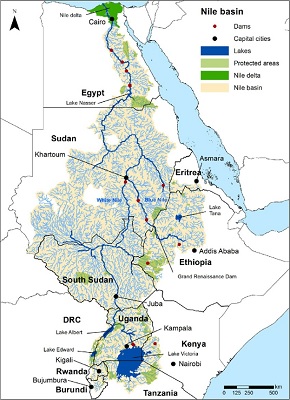
The Nile River Cooperative Framework Agreement (CFA) represents a collective effort to rectify historical inequities in the utilization of the Nile’s resources, experts say. The CFA officially came into force last Sunday, despite the absence of Egypt and Sudan. It aims to ensure fair access to the Nile for all basin countries, breaking the long-standing monopoly of the river’s waters by downstream nations.
A key element of the CFA is the establishment of a commission tasked with equitable water management. Initiated by Ethiopia, the CFA was shaped through consultations involving a Panel of Experts between January 1997 and March 2000.
Rather than imposing fixed water allocations, the CFA provides a cooperative framework promoting sustainable development and integrated water management. The agreement aims to conserve the river for future generations while fostering harmony among the basin countries.
In an exclusive interview with The Ethiopian Herald, Fekahmed Negash, a former Abbay Dam negotiator and water resources researcher, emphasized the importance of a robust legal framework like the CFA. He noted that such agreements not only safeguard the interests of all basin nations but also encourage collaboration and attract funding for water-related projects.
The CFA also lays the foundation for the Nile River Basin Commission, which will operate independently, fostering regional development and ensuring smooth cooperation between upstream and downstream countries. Ethiopia’s Minister of Water and Energy hailed the CFA’s enactment as a significant step toward sustainable water management and regional collaboration.
Fekahmed contrasted the CFA with outdated colonial-era agreements from 1929 and 1959, which primarily benefited Egypt and Sudan. He explained that the CFA reflects the collective will of upper basin countries to reject those inequitable arrangements. The agreement strengthens regional ties while prioritizing fair resource distribution.
Ambassador Ibrahim Idris, advisor to the Minister of Foreign Affairs on Transboundary Resources and a former legal advisor to Ethiopia’s Abbay Dam negotiating team, shared the above rationale. He emphasized that the CFA reinforces the rights of upstream nations, challenging Egypt’s historical dominance. Under the CFA, the approval of six countries makes the agreement legally binding.
Ambassador Ibrahim criticized Egypt’s inconsistent stance since the CFA was signed in Entebbe in 2011. Initially, Egypt pressured upstream nations to withdraw support, attempting to block ratification. However, these efforts failed, with South Sudan recently becoming the latest country to endorse the CFA.
Historically, Egypt has relied on colonial agreements to justify its water claims, particularly against Ethiopia’s Abbay Dam project. Ethiopia’s leadership in negotiating the CFA has shifted the dynamics toward more equitable water sharing. As the first country to sign and ratify the agreement, Ethiopia set a precedent for other nations to follow.
Fekahmed highlighted that while the CFA’s ratification is a major milestone, establishing a functional commission will require continued negotiation and preparation. He urged the international community to recognize the CFA’s legitimacy, as it aligns with international water laws.
Looking forward, Fekahmed speculated that Egypt might eventually ratify the CFA to safeguard its interests. However, he cautioned that resistance from Egypt could lead to diplomatic challenges, particularly around the formation of the Nile River Basin Commission.
Ambassador Ibrahim stressed Ethiopia’s extensive efforts from 2001 to 2008 to counter opposition from Egypt and Sudan. A pivotal moment occurred in 2008 during a meeting in Kinshasa, where Ethiopia secured support from other upstream countries. This momentum culminated in the 2010 Sharm el-Sheikh meeting, where several nations agreed to sign the CFA.
Despite Egypt’s reluctance, Ambassador Ibrahim argued that the CFA’s implementation will proceed. He emphasized that Egypt stands to benefit by participating, as international water laws tend to favor downstream nations. Refusal to engage could marginalize Egypt in future negotiations.
The CFA challenges the outdated 1959 agreement, which allocated 55.5 billion cubic meters of water to Egypt and 18.5 billion to Sudan, leaving upstream nations with little say. The CFA promotes a fairer distribution of resources, fostering cooperation among all basin countries.
In conclusion, Ambassador Ibrahim urged Egypt to engage in negotiations and ratify the CFA. He warned that attempts to undermine the agreement, such as exerting influence through Somalia, would not yield positive outcomes and could increase regional tensions.
Although the CFA is now legally in force, Fekahmed cautioned that challenges lie ahead. Establishing a functional commission and managing ongoing negotiations will require careful coordination and collaboration. The international community’s support will be vital to ensure the CFA’s success and long-term stability in the Nile Basin.
BY EYUEL KIFLU
THE ETHIOPIAN HERALD SUNDAY EDITION 20 OCTOBER 2024





